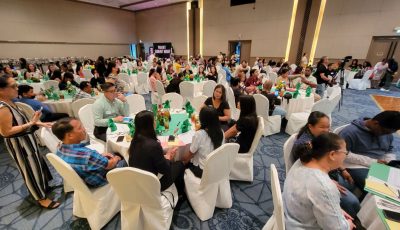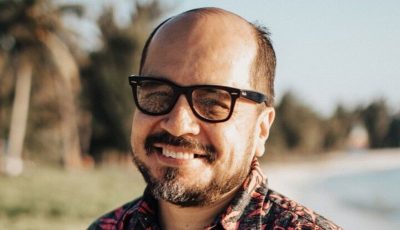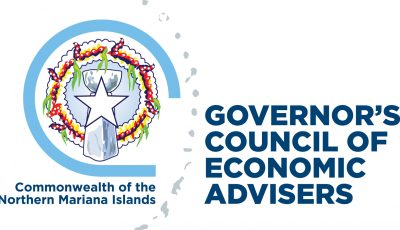State of Northern Marianas College
Editor’s Note: The following is the transcript of Northern Marianas College president Galvin Deleon Guerrero’s speech that was delivered at the State of Education Address on Thursday, Sept. 22, 2022, at the Saipan World Resort.
Last of a three-part series
The college has already begun investing in our economy with the recent decision by the Small Business Administration to establish and fund a Small Business Development Center, or SBDC, in the CNMI, which is once-again housed at the college. Since earning this designation, the SBDC has aggressively engaged with community partners to support the governor’s BOOST program, bring women entrepreneurs together for training and development, work with local farmers on securing micro-grants, and hosting several small business nights at the college’s Mango Terrace.
Complementing the work of our SBDC, the college’s Community Development Institute has begun active outreach efforts to offer more modular training programs to our community, develop a maritime program with 500 Sails, further develop the CNMI’s apprenticeship program, and even offer TED-type leadership talks to companies and organizations.
The college’s investment in our economy is best exemplified by our graduates, who have accomplished amazing things for our community. Consider, for example, Charlie Bell Foster and Jamerie Paras, whose research into a pay-as-you-go concept for taxes was showcased at a Saipan Rotary Club meeting and featured in a recent issue of TAGA Plus magazine.
Finally, to take care of our community, we need to foster a spirit of stewardship. This happens when we practice regenerative living, cultivating behaviors that promote diversity, equity, inclusion, justice, and access, and promoting cultural enrichment that protects our islands’ indigenous legacy.
In this regard, the college’s Cooperative Research Extension and Education Services is leading the way. While we do not have the time today to talk about the millions of dollars, dozens of programs, and countless research publications that CREES handles, I’d like to share a few recent examples with you. CREES was recently awarded $3.4 million to conduct food science research and spur further economic development in the CNMI. The project, led by NMC-CREES food scientist, program leader, and professor Dr. Zaidul Sarker, will use the bulk of the funds to purchase equipment for the food science lab on Saipan and a smaller lab on Rota.
CREES’s Aquaculture and Natural Resources Program also secured a $536,000 grant to construct mangrove crab farming demonstration units on the islands of Saipan, Tinian, and Rota. The demonstration units, which are funded by a Technical Assistance Program grant through the U.S. Department of the Interior’s Office of Insular Affairs, will be used by NMC-CREES to provide training to any individual who would like to pursue mangrove crab farming.
CREES’s 4H Marianas is yet another phenomenal program that cultivates stewardship in our community by offering a wide array of experiences to young people in health, science, agriculture, and civic engagement, such as the extremely successful Camp Magalahi summer program.
And CREES’s very own dean, Patty Coleman, was part of a team that secured first place in the semi-finals of the University of Oxford’s “Map the System” competition. Their research focused on a food systems map that identified “complex systemic causes” of the prevalence of high-risk diets (processed foods, sugary drinks) in the CNMI, and how the indigenous people of the Marianas have some of the highest rates of diet-related diseases in the world.
These are all examples of stewardship. After all, at the end of the day, stewardship is what we’re about. And the future that lies ahead calls on all of us to be stewards, because, to be honest with you, when I look at the years ahead, it’s gonna be rough.
Climate change isn’t getting any better. We can expect more typhoons like Super Typhoon Yutu to occur more frequently and with equal or even greater intensity.
Globalization is not going away and we remain increasingly vulnerable to economic forces beyond our control. To put it bluntly: we all see the fiscal cliff coming when federal funds dry up as our tourism industry continues its slow recovery. You think budgets are tight now? Wait until then.
And, if this pandemic has taught us anything, it’s that what happens across the globe—inflation, the war in the Ukraine, or rising tensions in China—can and will affect us here in the Pacific.
However, when I look ahead at these looming threats, I am reminded about that girl, saving starfish, one at a time. When looking at the hundreds of starfish that needed saving, she could have given up. She could have given in to fear and despair. But she didn’t. Neither should we. We can make a difference, no matter how small and no matter how hard and no matter how long it takes. So long as we can save one starfish, one person, one Commonwealth, we should at least try.
You see, I firmly believe that we can and we will make it through the challenges that lie ahead, if we embrace stewardship and take care of our community, take care of our resources, and, perhaps most importantly, take care of each other.
That’s what our ancestors did when they navigated the entire Pacific with nothing more than vessels carved by their own hands, wisdom passed down for generations, and deep faith in each other. They knew that if they took care of each other, no matter how violent the storm, how dark the night, or how perilous the journey, they would find their way, together. So can we. So should we.
So, steady the course, batten down the hatches, and let’s sail ahead together, as stewards of each other. And, above all, stay safe, stay calm, and sail on.
Galvin DeLeon Guerrero (Special to the Saipan Tribune)
Dr. Galvin Deleon Guerrero is the president of Northern Marianas College.



























